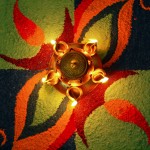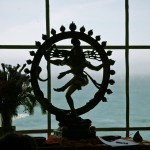Yesterday, I had a long and hard discussion with a friend of mine. The essential difference between our "world-views" was – if the world and the creation is a Reality or an Illusion. I believe that the creation is an "illusion" in that it is created through our intention and not that it is real. He, on the other hand believes, that simply the "existence" of an object A at a place X which every one can verify proves that it is real or it could have been seen wherever the different "observers" chose to see. His other objection – very valid one as a question – was if all is Illusion, then why not NOT ACT AT ALL? To me, the first question needs more of my thought and analysis but the second one boils to the basic question of – not How – but why does the Infinite One chooses to manifest itself as the known or the finite? The very reason as to why "He/She/It" chose to manifest is the very reason, in my view, should we act. Because if "the" One chooses to "act" despite the apparent uselessness of action, should be necessarily the reason why "I" as a mind and body should act!
The question of why did the Infinite manifest is a good one. Why indeed, even if the reality is an illusion, should it have arisen? Of course, every part of my friend’s interpretation was open to questions that made his complete picture irreconcilable except – as he steadfastly maintained – it makes me "satisfied" that I have answered to myself. The basic question on why his causeless, bound-by-his-nature God needed to act in a way NOT decided by Him was, in my view, the most serious one that he had created a self-indulgent work-around for in his mind. He could not completely pinpoint what it was though.
Further, he believes that there are three "actors" in the entire play of creation – Prakriti (nature which is eternal and "dumb"), self (or Atman which is Eternal too), and Super Self/God (which is Eternal too). While Atman/self and Super Self/God are "consciousness", Prakriti is "energy". How does one differentiate consciousness from energy is a question that could not be answered.
However, I did resolve to "understand" his point of view by going to his source at some point in my life. I hold him in high regard and what he does believe in must have some good and strong basis – although intelligence or intellectual capacity of a person is no measure of the validity of his beliefs powered by his religious affiliations – for there are enough scientists even today who swear by the Bible’s version of seven days and Adam and Eve version in its literal form! So, though I believe in his intelligence, I have less faith in his intellectual humility to have an open mind for I saw enough evidence to the contrary. A mind which is convinced of itself cannot explore. It just knows. Knowledge, which is an estimation of reality, is not a good substitute to experience on the spiritual journey. The spiritual Knowledge can only be redeemed the day it is abandoned! A Knowledge that is held dear can never be abandoned. It creates its own bondage. Static knowledge borne of faith lacking of experimentation and exploration is the Mother of superstition. I have seen it many a times and that alone is its damnation enough in my mind.
However, here are the basic tenets of the sect that he believes in. It is interesting that though, he a believer of these basic tenets says that God, Prakriti (which is part of Srishti – of creation) and self are "eternal"! Reading the second of the 10 principles does not seem to imply that – since "God" is the "creator" of this – Eternal? – Srishti itself!
This is the beginning of my journey to understand his point of view and also look for my answers and Truth. I may not be able to "get" all the answers, but I resolve to NOT "make up" an alibi for an answer and be "satisfied" with it. May the Spirit of Enquiry be my constant companion!
ARYA SAMAJ KE DAS NIYAM THE TEN PRINCIPLES OF A NOBLE SOCIETY |
|
1. SAB SATYAVIDYAA AUR JO PADARTHA VIDYA SE JAANE JAATE HAI UN SAB KAA AADIMOOL PARAMESHWAR HAI The first (efficient) cause of all true knowledge and all that is known through knowledge is God, the Highest Lord (Parameshwar). |
|
2. ESHWAR SACH-CHIDAANAND SWAROOP, NIRAAKAAR, SARVASHAKTIMAAN, NYAAYAKAARI, DAYAALOO, AJANMAA, ANANT, NIRVIKAAR, ANAADI, ANUPAM, SARVADHAAR, SARVESHWAR, SARVAVYAAPAK, SARVAANTARYAAMEE, AJAR, AMAR, ABHAYA, NITYA, PAVITRA AUR SHRISTI KARTAA HAI USEE KEE UPAASANAA KARNEE YOGYA HAI God (Ishwara) is existent, and blissful. He is formless, omnisicient, unborn, endless, unchangeable, beginningless, the support of all, the master of all, omnipresent, immanent, unageing, immortal, fearless, eternal, and holy, and the maker of all. He alone is worthy of being worshipped.
|
|
3. VED SAB SATYAVIDYAAO KAA PUSTAK HAI. VED KAA PARDHANAA- PARDHAANAA AUR SUNNAA-SUNAANAA SAB AARYO KA PARAM DHARM HAI Vedas are the scripture of true knowledge. It is the first duty of the Aryas to read them, teach them, recite them, and hear them being read. |
|
4. SATYA KE GRAHAN KARNE AUR ASATYA CHHORNE SARVADAA UDYAT RAHANAA CHAAHIYE. One should always be ready to accept truth and give up untruth. |
|
5. SAB KAAM DHARMANUSAAR ARTHAAT SATYA AUR ASATYA KO VICHAAR KARKE KARNE CHAAHIYE. One should do everything according to the dictates of Dharma, i.e. after due reflection over right and wrong. |
|
6. SANSAAR KAA UPKAAR KARNAA ESA SAMAAJ KAA MUKHAYA UDHESYA HAI ATHAART SHAAREEKRIK, AATMIK AUR SAAMAAJIK UNNATI KARNAA. Doing good to the whole world is the primary objective of this society, i.e. to look to its physical, spiritual and social welfare. |
|
7. SAB SE PRITIPOORVAK DHARMANUSAAR YATHAYOGYA VARTANA CHAAHIYE Let thy dealing with all be regulated by love and justice, in accordance with the dictates of Dharma. |
|
8. AVIDYAA KAA NAASH AUR VIDYAA KEE VRIDDHI KARNE CHAAHIYE One should promote knowledge (vidya) and dispel ignorance (avidya). |
|
9. PRAYEK KO APNEE HEE UNNATI SE SANTUSHT NA RAHANAA CHAAHIYE KINTU SAB KEE UNNATEE ME APNEE UNNATI SAMAJHNEE CHAAHIYE One should not be content with one’s own welfare alone, but should look for one’s welfare in the welfare of all. |
|
10. SAB MANUSHYO KO SAAMAAJIK SARVAHITAKAAREE NIYAM PAALNE ME PARTANTRA RAHANAA CHAAHIYE AUR PRATYEK HITKAAREE NIYAM PAALNE ME SAB SWANTANTRA RAHE. One should regard one’s self under restrictions to follow altruistic rulings of society, while in following rules of individual welfare all should be free. |
Powered by Qumana














